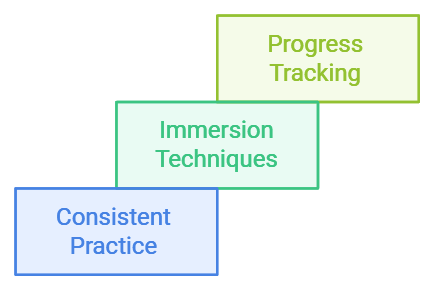How Many Hours Does It Take to Learn French? A Complete Timeline Guide
Learning French typically takes between 580 to 600 hours for English speakers to reach general conversational fluency, according to the Foreign Service Institute (FSI). However, the journey to complete mastery can extend up to 1,200 hours, depending on your learning method, dedication, and end goals.
Key Takeaways
- Reaching basic fluency (B1 level) requires approximately 350-400 hours of dedicated study
- Learning methods significantly impact timeline – immersion can cut learning time by 50%
- Age plays a crucial role – children typically learn 30-40% faster than adults
- Consistent daily practice of 1-2 hours yields better results than intensive cramming
- Modern technology and AI tools can reduce traditional learning time by up to 25%
Understanding Your French Journey
The path to French fluency isn’t one-size-fits-all. Your timeline depends largely on your starting point and desired proficiency level. Here’s a detailed breakdown of what to expect:
| CEFR Level | Hours Required | What You Can Do |
|---|---|---|
| A1 (Beginner) | 70-150 | Basic greetings, simple conversations |
| A2 (Elementary) | 150-200 | Daily interactions, simple opinions |
| B1 (Intermediate) | 300-400 | Work discussions, travel needs |
| B2 (Upper-Intermediate) | 500-600 | Complex conversations, professional work |
| C1 (Advanced) | 700-800 | Academic discourse, nuanced expression |
| C2 (Mastery) | 1000-1200 | Near-native proficiency |
Age-Specific Learning Patterns
Your age significantly impacts how quickly you’ll learn French. Here’s what research reveals:
Children (5-12 years) Children typically achieve fluency 30-40% faster than adults due to their natural language acquisition abilities. Their timeline often looks like:
- Basic fluency: 400-450 hours
- Full fluency: 800-900 hours
Teenagers (13-18 years) Teenagers benefit from both cognitive development and neural plasticity:
- Basic fluency: 500-550 hours
- Full fluency: 900-1000 hours
Adults (19+) While adults may take longer, they benefit from better learning strategies:
- Basic fluency: 580-600 hours
- Full fluency: 1000-1200 hours
Modern Learning Methods and Their Impact
The way you learn French can dramatically affect your timeline. Here’s how different methods compare:
Traditional Classroom
- 3-4 hours weekly
- Timeline: 24-36 months to fluency
- Best for structured learners
Immersion Programs
- 20-30 hours weekly
- Timeline: 3-6 months to fluency
- Best for rapid progress
Online Learning
- Flexible hours
- Timeline: 12-18 months to fluency
- Best for self-paced learners
Technology’s Role in Accelerating Learning
Modern technology has revolutionized French learning speeds. AI-powered tools and virtual immersion can reduce learning time by up to 25%. Key innovations include:
- Virtual Reality immersion programs
- AI conversation partners
- Adaptive learning algorithms
- Spaced repetition software
Industry-Specific French
Different career paths require different levels of French proficiency:
Business French
- Timeline: 400-500 hours
- Focus: Negotiations, presentations, email communication
Academic French
- Timeline: 600-700 hours
- Focus: Research writing, lectures, academic discourse
Medical French
- Timeline: 700-800 hours
- Focus: Patient communication, medical terminology
Success Strategies
To optimize your learning timeline, consider these proven approaches:
- Consistent Practice
- Daily 1-2 hour sessions outperform weekend cramming
- Use spaced repetition for vocabulary retention
- Combine multiple learning methods
- Immersion Techniques
- Watch French media with subtitles
- Join French conversation groups
- Use language exchange apps
- Progress Tracking
- Set monthly milestone goals
- Use proficiency tests regularly
- Keep a learning journal

Regional Variations
Different French dialects can affect your learning timeline:
European French
- Standard timeline applies
- Focus on formal French
Canadian French
- Additional 50-100 hours for dialect adaptation
- Different vocabulary and expressions
African French
- Regional variations require 30-50 extra hours
- Unique cultural contexts
Remember, learning French is a journey, not a race. While these timelines provide a framework, your personal progress may vary. The key is maintaining consistent practice and choosing methods that match your learning style. Have you considered which learning approach might work best for you?
Would you like me to expand on any particular aspect of French learning timelines or provide more specific information about certain learning methods?
